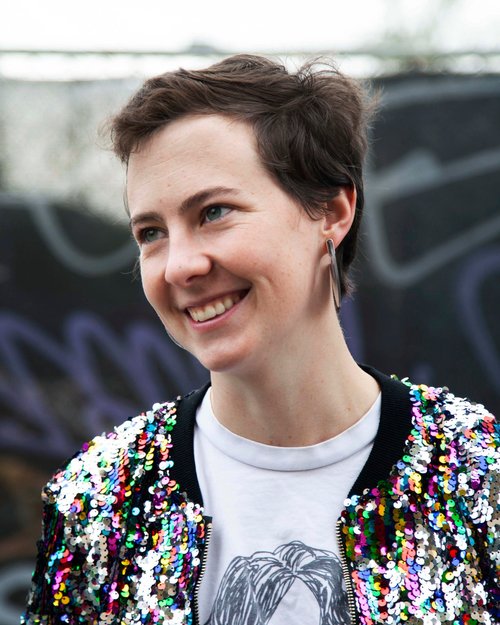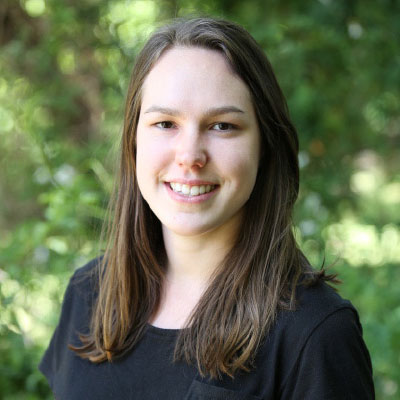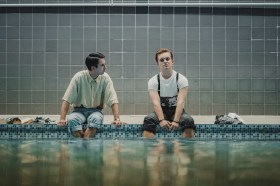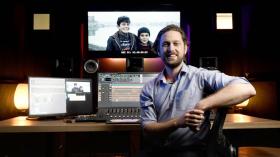The Australian screen industries are more exciting, more unstable, and more competitive places to work than ever. In an industry that relies on freelancers more and more heavily, it can be hard for an emerging producer to make their mark. Do you pick a specialisation and knuckle down, or do you spread your time across a lot of projects? Film, games, or television? And what kinds of production roles are out there, in these rapidly changing industries? How can an aspiring producer make their creative portfolio stand out? Never fear: screenhub talked to two standout producers with experience across film, television and games, about the pros and cons of working in each discipline – or across multiple disciplines.

Stephanie Westwood freelanced in film, games, and television. Image supplied.
Working at the intersection
Stephanie Westwood currently works as an Associate Producer at the Melbourne branch of Seven Studios, but her background is largely in freelancing. After studying Film and Television at Swinburne University, she quickly developed a portfolio covering a wide variety of screen media; while games can be a notoriously tricky industry to crack, she attributes her first jobs in games to her work on games-adjacent film projects.
She worked as a project manager on Lester Francois and Anna Brady’s Game Loading: Rise of the Indies, and produced video content for Kickstarter campaigns by Tin Man Games and GX Australia, as well as for Melbourne International Games Week promotional material, on behalf of Creative Victoria. She was subsequently recommended for, then hired, by a serious games start-up; ‘they were looking for a producer with video content skills, who could also tackle the production of games. It was my first proper games role, but by that point, I had good connections, and insight into the industry.’
She told Screenhub that having some familiarity with games is an incredibly valuable point of difference, in a very competitive industry: ‘In 2017, I was producer’s assistant to Beth Frey on the fourth season of ABC kid’s show Nowhere Boys. I also was the producer of the online interactive spell book that we launched simultaneously with the show. For producers who work in games: film and television productions are increasingly interested in integrating interactive experiences; they will need you! For those who work in film and TV, games productions can benefit from your experience balancing a lot of moving parts, working in collaborative environments, and your experience with visual storytelling and character.’
Ella Macintyre moved from a production role at Epic Film to work with Adelaide-based entertainment company, Mighty Kingdom, first in a marketing role, and now as Head of Product. The studio primarily produces mobile games working with original IP, as well as producing games for larger brands like Lego and Disney. While it may look like a far cry from her earlier career in television and film production, she was surprised by the similarities: ‘Ultimately, we all just want to be entertained. Understanding the core desires of your audience and finding an engaging, entertaining ways to deliver on that is a universal constant in every entertainment industry.’

Ella Macintyre trained in film, but she’s thriving in games. Image Supplied
Working in production in a studio of this size, Macintyre has to keep track of the micro and macro: ‘On the macro side – we need to be at the forefront of emerging technologies and trends. I spend a lot of time thinking about where the industry is going, what consumers will want and expect from video games in future, and what we need to do to exceed those expectations, from identifying market opportunities and audiences, to developing stories, brands and business models to serve those audiences.
‘I also help the individual teams who are working on our current products. I act as both a sounding board and as an outside perspective for their product managers and producers as they deal with the inevitable challenges of driving a creative project.’
Westwood agrees: ‘A lot of the seemingly unquantifiable skills you need to be a producer transfer directly – people management, intuition. Hard skills are too; delegation, time management, scheduling, managing finance, liaising with stakeholders – these are all transferable.’
Pros and Cons
For Westwood, the predictability of full-time work in a studio didn’t suit her work style as well as the constant flux of television; for Macintyre, however, this more grounded workplace was a chance to develop deeper creative connections; ‘I really enjoy working consistently with one team. In film, with the exception of a few roles, everyone is so transient. You get together for pre-production and a shoot, and then 6 or 12 weeks later you all go your separate ways. During the shoot, you develop those deep working relationships where you’re creating and working on challenges together, and then after wrap, many of those relationships are lost. In games, I’ve found you reap the benefits of the investments you make in each other for much longer.’
She found that conventional screen projects are rife with disappointment; ‘the path to market was very long and full of gatekeepers. Most frustrating was how finite it was; when you get to production you have extremely limited chances of committing what you want to film. In the edit, you have a limited pool to draw from to solve any problems, and worst of all, once you get to market it’s extremely difficult to iterate based on feedback from your audience. And that’s only if you’ve managed to rise enough money to mount a production in the first place!’
final words
‘Film and television has become so multi-platform, and premium quality storytelling is becoming the norm in games – it’s such a huge benefit to cultivate a deep understanding of different pathways to audiences, and all the ways that content is consumed, when working in an industry like ours.’





